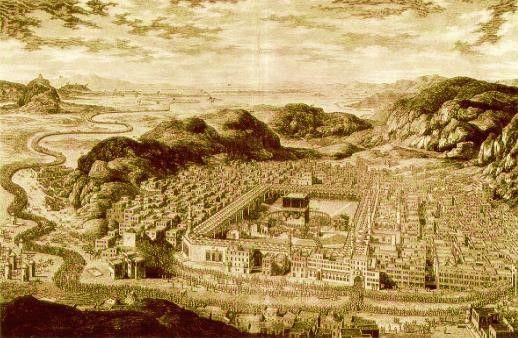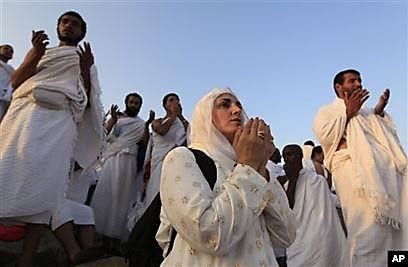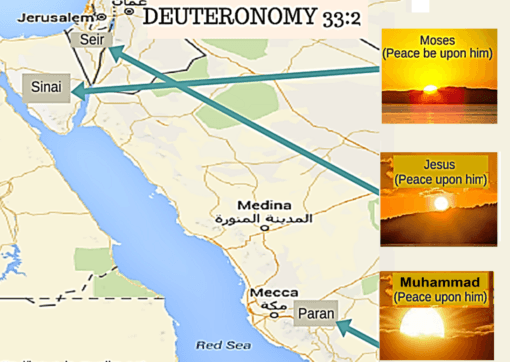
IS MAKKAH MENTIONED IN THE BIBLE?
By Dr Muhammad Solaiman
The Bible, the Divine Book of Christians, was revealed over thousands of years. Although the writers of the Bible are said to be divinely inspired, they purported God, like human beings, to need to have rest, to regret and, to have a son. Likewise, the prophets and messengers of God, who are supposed to be good examples for their people and were divinely guided, are purported to have drunk alcohol, got intoxicated and committed adultery.
On the other hand, most Biblical prophecies about the Prophet Muhammad (peace be upon him, PBUH) were obliterated and the relics of the remaining prophecies are denied and misinterpreted.
Nonetheless, we still can find in today’s Bible some relics of the prophecies about the Prophet Muhammad (PBUH)1, Muslims, Ka’bah and Makkah.
Makkah is named Baka in the Bible
The name Baka is specifically mentioned in the Bible in Chapter eighty-four of Psalms. This chapter tells us about a sacred place for which souls yearn, hearts and flesh sing for joy to the living God and God’s praise is sung. This place is called “the Valley of Baca”. Baca is described as a dry place which was made into a place of springs in the vicinity of tents. A day there is better than a thousand elsewhere.
“How lovely is your dwelling place, Lord Almighty? My soul yearns, even faints, for the courts of the Lord; my heart and my flesh cry out for the living God. Even the sparrow has found a home, and the swallow a nest for herself, where she may have her young—a place near your altar, Lord Almighty, my King and my God. Blessed are those who dwell in your house; they are ever praising you. Blessed are those whose strength is in you, whose hearts are set on pilgrimage. As they pass through the Valley of Baka, they make it a place of springs; the autumn rains also cover it with pools. They go from strength to strength, till each appears before God in Zion. Hear my prayer, Lord God Almighty; listen to me, God of Jacob. Look on our shield, O God; look with favour on your anointed one. Better is one day in your courts than a thousand elsewhere” (Psalms 84: 1-10).
Let’s analyse the above Psalms’ verses.
- “My soul yearns, even faints, for the courts of the Lord; my heart and my flesh cry outfor the living God”:
“Our Lord, I have settled some of my descendants in an uncultivated valley near Your Sacred House, our Lord, that they may establish prayer. So make hearts among the people incline toward them and provide for them from the fruits that they might be grateful” (Qur’an 14:37).
- “The sparrow has found a homeand the swallow a nest“:
Makkah is a place where birds and all animals are safe because hunting and killing are forbidden. Anyone who hunts or kills an animal in Makkah has to expiate for his sins.

- Blessed are those who dwell in your house; they are ever praising you:
Millions of Muslims go to Makkah every year for Umrah and pilgrimage. They spend several days occupying all their time praising God and fully submitting to Him. They are blessed because they sacrifice money and everything to visit and dwell in the House of God.
Muslims are ever praising and glorifying God in their prayers, and supplications. They also start anything in His name. During their visits to His house for pilgrimage they sing:
O, my Lord, here I am. Here I am associating no partners to You. Verily, all praise is for You. Every bounty is from You and all Sovereignty is Yours. You have no partner.
- Blessed are those whose strength is in you, whose hearts are set on pilgrimage.
Muslim pilgrims dwelling in the Holy House of God in Makkah, ask God for forgiveness. They drive their strength by fully relying on Him.

- “As they pass through the Valley of Baka“:
Baka is one of the various names of Makkah as we read in the Qur’an:
“Indeed, the first House [of worship] established for mankind was that at Baka – blessed and guidance for the worlds” (Qur’an 3:96).
- “They make it a place of springs“:
The spring of “Zamzam” is beside the Ka’bah in the Holy Mosque in Makkah. This spring has been continuously producing water for thousands of years since the time of Abraham (PBUH). It has turned Makkah to an inhabited place in the arid desert.
- “Better is one day in your courts than a thousand elsewhere“:
The reward of the pilgrims who visit the Holy Mosque of God in Makkah is great. The Prophet Muhammad (PBUH) said:
“One prayer in my Mosque (in Madinah) is better than one thousand prayers in any other mosque excepting the Sacred Mosque (in Makkah) and one prayer in the Sacred Mosque is better than one hundred thousand prayers elsewhere” (Narrated Ahmad and Ibn Majah).
Paran refers to Makkah in the Bible
Paran was the habitat of Hagar and Ishmael
Makkah is also referred to as “Paran” in the Bible. Ishmael and his mother Hagar settled in the desert of Paran after Abraham left them.
“And God heard the boy crying, and the angel of God called to Hagar from heaven and said to her, ‘What is the matter, Hagar? Do not be afraid; God has heard the boy crying as he lies there. Lift the boy up and take him by the hand, for I will make him into a great nation.’ Then God opened her eyes and she saw a well of water. So she went and filled the skin with water and gave the boy a drink. God was with the boy as he grew up. He lived in the desert and became an archer. While he was living in the Desert of Paran, his mother got a wife for him from Egypt” (Genesis 21:17-21).
The descendants of Ishmael and his son Kedar are the Arabs, who have lived since that time until now in Paran.
Paran in Moses’ prophecy
“And he (Moses) said, The Lord came from Sinai, and rose up from Seir unto them; he shined forth from mount Paran, and he came with ten thousands of saints: from his right hand went a fiery law for them” (Deuteronomy 33:2, KJV).
“The Lord came from Sinai” refers to God’s revelation unto Moses (PBUH). “He rose up from Seir” refers to His message from the Nazarene. “He shined forth from mount Paran“, refers to Makkah.
Ishmael and his descendants have lived in Paran. Muhammad (PBUH), the descendant of Ishmael and Kedar, is the only prophet who appeared in the wilderness of Paran. Therefore, God shines forth from Paran, through His message of Islam to Muhammad (PBUH).
The Prophet Muhammad (PBUH) had to flee with his followers from Makkah to Madinah. However, he re-entered it again with ten thousand believers (referred to as saints in the above verses) to give the fiery Law of God.

Pilgrimage to Makkah in Isaiah (60:1-7)
“Arise, shine, for your light has come, and the glory of the Lord rises upon you. See, darkness covers the earth and thick darkness is over the peoples, but the Lord rises upon you and his glory appears over you. Nations will come to your light, and kings to the brightness of your dawn. Lift up your eyes and look about you: All assemble and come to you; your sons come from afar, and your daughters are carried on the hip. Then you will look and be radiant, your heart will throb and swell with joy; the wealth on the seas will be brought to you, to you the riches of the nations will come. Herds of camels will cover your land, young camels of Midian and Ephah. And all from Sheba will come, bearing gold and incense and proclaiming the praise of the Lord. All Kedar’s flocks will be gathered to you, the rams of Nebaioth will serve you; they will be accepted as offerings on my altar, and I will adorn my glorious temple” (Isaiah 60:1-7).
In the verses, addresses a prophecy about the Prophet Muhammad (PBUH). He would appear in a time of darkness to fill the world with the light of God. All the flocks and tribes of Kedar and people from the entire world have gathered around him.
“And proclaim among men the pilgrimage: they shall come to you on foot and on every lean camel; they shall come from every deep ravine” (Quran 22:27).
Muslims sacrifice animals during Hajj (pilgrimage) and Muslims all over the world sacrifice animals in Eid Al Adha (the feast of sacrifice). People would come seeking the satisfaction of God
Makkah is forbidden for the unbelievers
“And a highway will be there; it will be called the Way of Holiness. The unclean will not journey on it; it will be for those who walk in that Way; wicked fools will not go about on it” (Isaiah 35:8).
Non-Muslims are not allowed to enter the Holy City of Makkah, exactly as described above.
“O, you who have believed, indeed the polytheists are unclean, so let them not approach al-Masjid al-Haram (the Sacred House) after this, their [final] year. And if you fear privation, Allah will enrich you from His bounty if He wills. Indeed, Allah is Knowing and Wise” (Quran 9:28).
Jesus prophesied a new place for God’s worship
The place is other than Jerusalem
When Jesus Christ was asked about the place where worship must be conducted, he stated that worship will be conducted at a new place other than Jerusalem. Through the message of Islam as conveyed by the Prophet, the place of worship of God moved to Makkah.
“The woman said to him, “Sir, I perceive that you are a prophet. Our fathers worshipped on this mountain, but you say that in Jerusalem is the place where people ought to worship.” Jesus said to her, “Woman, believe me, the hour is coming when neither on this mountain nor in Jerusalem will you worship the Father” (John 4:19-21).
The kingdom of God will be given to other people
According to Jesus (PBUH), the cornerstone of the kingdom of God will be taken away and given to other people.
“Jesus said to them, “Have you never read in the Scriptures: ‘the stone that the builders rejected has become the cornerstone; this was the Lord’s doing, and it is marvellous in our eyes’? Therefore I tell you, the kingdom of God will be taken away from you and given to a people producing its fruits” (Matthew 21:42-43).
“The stone that the builders rejected has become the cornerstone. This is the Lord’s doing; it is marvellous in our eyes” (Psalm 118:22-23).
The cornerstone of the kingdom of God is his straight Path, Islam. It has been given through the Prophet Muhammad (PBUH) to the Muslims who represent today one-fourth of the population of the world.
_________
References:
1- Restore your original religion.
2- The Glorious Qur’an
3- Al-Bukhari
4- The Holy Bible

